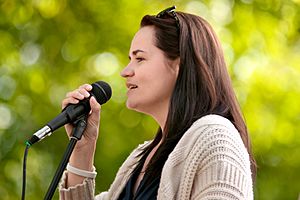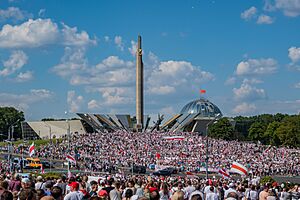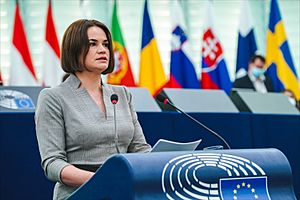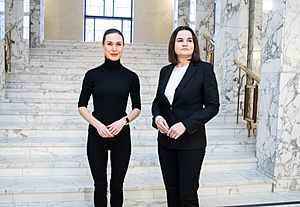Sviatlana Tsikhanouskaya facts for kids
Quick facts for kids
Sviatlana Tsikhanouskaya
|
|
|---|---|
|
Святлана Ціханоўская
|
|
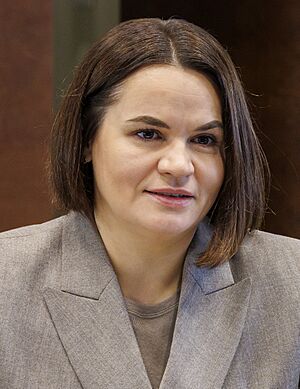
Tsikhanouskaya in 2024
|
|
| President of the Coordination Council | |
| Assumed office 14 August 2020 |
|
| Cabinet Head | Herself |
| Preceded by | Office established |
| Head of the United Transitional Cabinet | |
| Assumed office 9 August 2022 |
|
| President | Herself |
| Deputy | Pavel Latushko |
| Preceded by | Office established |
| Personal details | |
| Born |
Sviatlana Heorhiyeuna Pilipchuk
11 September 1982 Mikashevichy, Brest Oblast, Soviet Union (now Belarus) |
| Political party | Independent |
| Spouse | Sergei Tikhanovsky (2004) |
| Children | Ahniya and Karney |
| Education | Mozyr State Pedagogical University |
Sviatlana Tsikhanouskaya, born on September 11, 1982, is a brave leader from Belarus. She became a well-known figure in her country's political opposition. In 2020, she ran for president against the long-time leader, Alexander Lukashenko.
After the election, which many believed was unfair, Tsikhanouskaya became a voice for those who wanted change. She now leads an alternative government from outside Belarus, working to bring democracy to her homeland. She has met with many world leaders to gain support for her cause.
Contents
Early Life and Education
Sviatlana Pilipchuk was born in a small village called Mikashevichy. Her father worked at a concrete factory, and her mother was a cook. Sviatlana loved to read, especially books from other countries, which helped her learn English.
When she was twelve, Sviatlana visited Roscrea, Ireland. This trip was organized by a charity called Chernobyl Lifeline. The charity helped children from areas near the Chernobyl exclusion zone to reduce their exposure to radiation. Sviatlana was good at school and helped translate for other children during her visits. She stayed with a kind host family, the Deanes, who became like a second family to her.
Sviatlana went to Mozyr State Pedagogical University to study teaching. In 2003, she met Syarhei Tsikhanouski, and they married in 2004. She then took his last name, Tsikhanouskaya. They have two children, a son and a daughter. Her son was born mostly deaf, and Sviatlana spent a lot of time helping him. She moved to Gomel so he could get special treatment, including a cochlear implant. Before 2020, Tsikhanouskaya worked as an English teacher and interpreter. She later stopped working to focus on raising her children.
The 2020 Presidential Election
How the Campaign Started
In 2019, Sviatlana's husband, Syarhei Tsikhanouski, started a YouTube channel. He used it to talk about problems in Belarus and challenge President Alexander Lukashenko. Syarhei became a popular opposition leader. He planned to run for president in the 2020 Belarusian presidential election. However, he was arrested just before the deadline to register as a candidate.
Because her husband was arrested, Sviatlana decided to run for president herself. She said she did it to show support for him. She registered as an independent candidate on July 14, 2020.
At first, Sviatlana didn't plan to lead a big campaign. Even when her husband was briefly released, he continued to campaign for her. She easily gathered the 100,000 signatures needed to run. Her candidacy was officially confirmed on July 19, 2020. After this, she began traveling across Belarus to hold campaign events.
Syarhei Tsikhanouski was arrested again. This time, he was accused of attacking a police officer, but many believed the incident was set up. With her husband in prison, Sviatlana Tsikhanouskaya became the main opposition candidate against Lukashenko. She joined forces with Veronika Tsepkalo, whose husband was also an opposition figure, and Maria Kalesnikava, another opposition campaign manager who was arrested.
President Lukashenko was facing problems in 2020, partly because of economic issues and his handling of the COVID-19 pandemic in Belarus. Many other opposition candidates were removed from the race. Lukashenko allowed Tsikhanouskaya to run because he thought a woman would not be a serious threat. He even made fun of her for being a female candidate. However, Sviatlana used this to her advantage, highlighting that she was a mother. This made many voters see her as an ordinary person, not a power-hungry politician.
Sviatlana described herself as an "accidental candidate." She said she would only be in office long enough to end Lukashenko's rule. She saw her role as a symbol for the opposition movement. She admitted that "every day was full of fear" during the campaign.
Campaigning for Change
Even though she ran as an independent, Tsikhanouskaya gained support from many different political groups in Belarus. Her rallies were the biggest in Belarus's recent history, with huge crowds gathering in cities like Brest and Minsk. People liked that she had no political experience, seeing her as a regular citizen like themselves.
During her campaign, Tsikhanouskaya received threats. She got phone calls saying, "We will put you behind bars and place your children in an orphanage." Despite this, she decided to keep going, saying there "must be a symbol of freedom." Because she was worried about her children's safety, she sent them to stay in Lithuania.
Tsikhanouskaya said she ran for president out of love, hoping to free her husband. She focused on three main promises:
- Releasing political prisoners.
- Setting limits on how long a president could serve.
- Holding new, fair elections.
She promised to step down once these changes happened. She also wanted to move Belarus away from its close ties with Russia. Her main goal was to make sure future elections were truly free and fair.
Her economic ideas included helping small and medium-sized businesses. She wanted to offer them loans and protect foreign investors.
Election Day and Leaving Belarus
The night before the election, police arrested some of Tsikhanouskaya's campaign staff. She went into hiding in Minsk but appeared at a polling station on election day. When the official results were announced, they showed her with only ten percent of the vote. Many believed this was due to electoral fraud to ensure Lukashenko won. Protests erupted across Belarus. Independent observers and election monitors said Tsikhanouskaya was the real winner. She stated, "I believe my eyes, and I see that the majority is with us."
The day after the election, Tsikhanouskaya went to the election commission. There, she was met by armed guards and forced to meet with a government official. She was given a choice: leave the country or go to prison, with her children taken away. They described how harsh prison life would be and what would happen to her children. She tried to negotiate her husband's release in exchange for leaving, but this was refused. However, she did manage to get her campaign manager, Maria Moroz, released. Tsikhanouskaya and Moroz then left for Lithuania.
Later, a video was released showing Tsikhanouskaya saying she accepted the election results and asking protesters to stop. Her supporters believed this video was made under force, like a hostage video.
Life in Exile
Leading the Opposition from Abroad
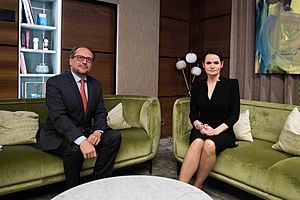
On August 11, 2020, it was announced that Tsikhanouskaya was safe in Lithuania. She felt she had "betrayed" her supporters by leaving. However, she soon declared herself the "leader of democratic Belarus." She set up a Coordination Council to help with a peaceful transfer of power from Lukashenko. She sees herself as a temporary leader until fair elections can be held.
Tsikhanouskaya has traveled to many European capitals, meeting with world leaders like President Joe Biden and Chancellor Angela Merkel. She has asked the international community not to recognize Lukashenko's reelection and to place sanctions on his government. Many Western countries and the European Parliament agree that Lukashenko's election was not legitimate.
On August 9, 2022, Tsikhanouskaya announced the creation of the United Transitional Cabinet in Vilnius. This group works on different areas, like preparing for a change in power and foreign affairs. In January 2023, Belarus declared Tsikhanouskaya's organizations to be extremist groups. Two months later, she was sentenced to fifteen years in prison in a trial where she was not present.
The European Parliament and several governments recognize Tsikhanouskaya and her groups as the true representatives of Belarus. They often call her "President" or "Leader of Democratic Belarus." In August 2024, Tsikhanouskaya and her groups agreed on how they would work together. This agreement states that she is the "National Leader" based on the 2020 election, until a free and fair election happens.
The Council of Europe, the European Union, and the United States have officially started working with Tsikhanouskaya's groups.
On June 21, 2025, Tsikhanouskaya's husband, Syarhei, was released from prison and joined her in Lithuania.
The War in Ukraine
When Russia invaded Ukraine in 2022, Tsikhanouskaya worked to support the anti-war movement in Belarus. She believes that Lukashenko's support for the invasion is a betrayal of his country.
Tsikhanouskaya and her supporters created the Pieramoha Plan (Victory Plan). This plan involves secret groups in Belarus sharing information and even carrying out acts of sabotage. She believes these groups should wait for "the right moment" when Belarus is unstable enough for a change in power.
Tsikhanouskaya argues that Lukashenko's rule in Belarus is a threat not only to Ukraine but also to neighboring countries like Latvia, Lithuania, and Poland. She supports continued help from Western countries for Ukraine and for those who oppose the government in Belarus. She has warned that people might get tired of the war, which could reduce support for Ukraine and Belarusian activists.
Awards and Recognition
Sviatlana Tsikhanouskaya has received many awards for her work. In 2020, she was named one of the BBC's 100 Women and was included in Bloomberg's "The Bloomberg 50" list. She and other Belarusian opposition leaders were given the European Parliament's 2020 Sakharov Prize for Freedom of Thought.
She has also received the 2020 Globsec prize for freedom, the 2022 Four Freedoms Award, and the 2022 Tipperary International Peace Award. In 2023, she received the IDU Bush-Thatcher Award for Freedom and the NATO PA “Women for Peace and Security” Award. She and other Belarusian opposition leaders won the 2022 Charlemagne Prize.
In 2021, she was nominated for the 2021 Nobel Peace Prize by the President of Lithuania and several members of the Norwegian parliament.
See also
 In Spanish: Svetlana Tijanóvskaya para niños
In Spanish: Svetlana Tijanóvskaya para niños
- 2020–2021 Belarusian protests
- Belarusian opposition
 | Shirley Ann Jackson |
 | Garett Morgan |
 | J. Ernest Wilkins Jr. |
 | Elijah McCoy |


